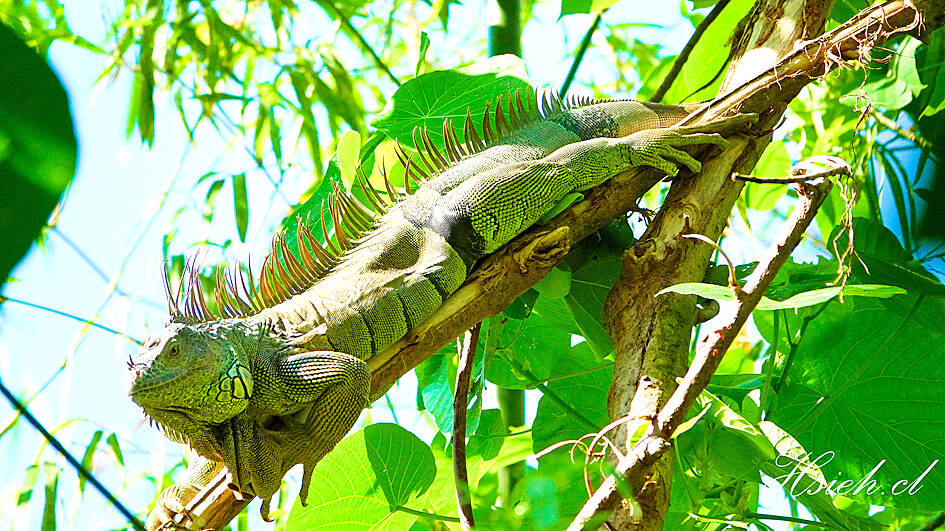Taiwan plans to cull as many as 120,000 invasive green iguanas this year to curb the species’ impact on local farmers, the Ministry of Agriculture said.
Chiu Kuo-hao (邱國皓), a section chief in the ministry’s Forestry and Nature Conservation Agency, on Sunday said that green iguanas have been recorded across southern Taiwan and as far north as Taichung.
Although there is no reliable data on the species’ total population in the country, it has been estimated to be about 200,000, he said.

Photo courtesy of Hsieh Chi-liang
Chiu said about 70,000 iguanas were culled last year, including about 45,000 in Pingtung County, 12,000 in Tainan, 9,900 in Chiayi, 6,500 in Kaohsiung, 5,000 in Changhua and about 100 in several other administrative regions.
This year, thanks to NT$20 million (US$608,606) in funding allocated by the government, the ministry has set a goal of culling 120,000, he said.
Based on its experience in eradicating the African sacred ibis, the ministry is relying mainly on professional hunting teams to cull the iguanas, which have established their presence in nine administrative regions.
About 300 people were recruited for the teams at hiring events held late last year in Tainan, Kaohsiung and Pingtung counties, while additional events would be held in Chiayi and Pingtung counties in the coming weeks, he said.
Shortly after the Lunar New Year, the ministry is also planning to release a new agricultural damage reporting app, which would include a section where farmers can post information on iguana sightings, he added.
In addition to threatening native species, iguanas are considered to be an agricultural pest and have caused widespread damage to red bean, gourd and other vegetable crops in central and southern Taiwan.
As an incentive, the ministry is offering professional hunters a bounty of NT$500 for every iguana of at least 30cm (snout to vent) they kill and NT$200 for every one shorter than 30cm.
For the general public, the bounties for iguanas are half that amount — NT$250 and NT$100, he said.
Chiu said his confidence in the iguana eradication effort drew in part from Taiwan’s success in removing African ibises, which were largely brought under control over a five-year period.
Compared with 2019, when 18,000 of the wading birds were culled, it is now estimated that only about 50 of them remain in Taiwan, he said.

‘DENIAL DEFENSE’: The US would increase its military presence with uncrewed ships, and submarines, while boosting defense in the Indo-Pacific, a Pete Hegseth memo said The US is reorienting its military strategy to focus primarily on deterring a potential Chinese invasion of Taiwan, a memo signed by US Secretary of Defense Pete Hegseth showed. The memo also called on Taiwan to increase its defense spending. The document, known as the “Interim National Defense Strategic Guidance,” was distributed this month and detailed the national defense plans of US President Donald Trump’s administration, an article in the Washington Post said on Saturday. It outlines how the US can prepare for a potential war with China and defend itself from threats in the “near abroad,” including Greenland and the Panama

A magnitude 4.9 earthquake struck off Tainan at 11:47am today, the Central Weather Administration (CWA) said. The hypocenter was 32.3km northeast of Tainan City Hall at a depth of 7.3km, CWA data showed. The intensity of the quake, which gauges the actual effect of a seismic event, measured 4 in Tainan and Chiayi County on Taiwan's seven-tier intensity scale, the data showed. The quake had an intensity of 3 in Chiayi City and County, and Yunlin County, while it was measured as 2 in Kaohsiung, Nantou County, Changhua County, Taitung County and offshore Penghu County, the data showed. There were no immediate reports of

The Chinese Nationalist Party (KMT) is maintaining close ties with Beijing, the Democratic Progressive Party (DPP) said yesterday, hours after a new round of Chinese military drills in the Taiwan Strait began. Political parties in a democracy have a responsibility to be loyal to the nation and defend its sovereignty, DPP spokesman Justin Wu (吳崢) told a news conference in Taipei. His comments came hours after Beijing announced via Chinese state media that the Chinese People’s Liberation Army’s Eastern Theater Command was holding large-scale drills simulating a multi-pronged attack on Taiwan. Contrary to the KMT’s claims that it is staunchly anti-communist, KMT Deputy

RESPONSE: The government would investigate incidents of Taiwanese entertainers in China promoting CCP propaganda online in contravention of the law, the source said Taiwanese entertainers living in China who are found to have contravened cross-strait regulations or collaborated with the Chinese Communist Party (CCP) could be subject to fines, a source said on Sunday. Several Taiwanese entertainers have posted on the social media platform Sina Weibo saying that Taiwan “must be returned” to China, and sharing news articles from Chinese state media. In response, the Mainland Affairs Council (MAC) has asked the Ministry of Culture to investigate whether the entertainers had contravened any laws, and asked for them to be questioned upon their return to Taiwan, an official familiar with the matter said. To curb repeated